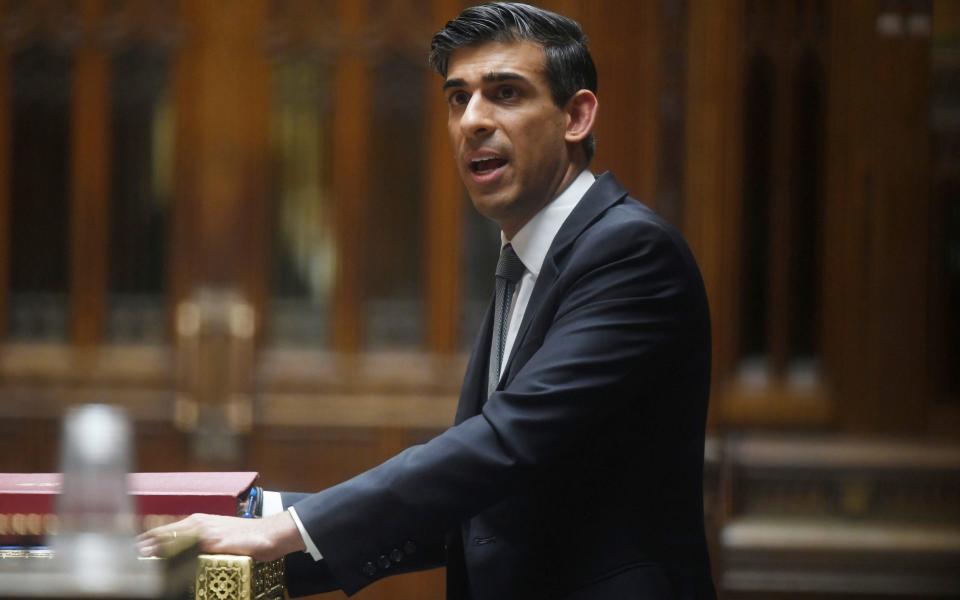Rishi Sunak’s 1p income tax decrease will be undercut by freeze on thresholds

A one pence cut in income tax by 2024 was promised on Wednesday by Rishi Sunak even though it will be undercut by his previous plans to freeze thresholds.
The Chancellor announced his intention to lower the basic rate of income tax before the end of the current Parliament from 20p to 19p.
The move has long been rumoured but only on Wednesday publicly declared in the Spring Statement and appears to confirm the next election will be in 2024 rather than 2023 as the Tories are unlikely to go to the polls before a populist tax cut has taken effect.
MPs and financial analysts said its re-announcement was an overt political move by Mr Sunak to burnish his credentials as a tax-cutting Chancellor before the next election without having to undo current revenue-raising measures like the hike in National Insurance (NI).
However, the 1p income tax cut - costing the Treasury some £5 billion - will be dwarfed by the amount of tax that the Chancellor will raise from British families, workers and pensioners through the freeze on income tax thresholds that takes effect next month.
An analysis by the Office for Budgetary Responsibility (OBR) published on Wednesday showed that the income tax threshold freezes would generate revenues equivalent to 0.6 per cent of GDP, compared with a reduction in the tax burden of just 0.2 per cent through the 1p cut.
When the thresholds were first announced two years ago, the OBR estimated freezing the thresholds would net £8 billion but now, with wage inflation factored in, it estimated it would generate £18 billion for the Treasury in extra tax.
The income tax threshold freeze will also wipe out the financial benefits of the NI tax breaks that Mr Sunak announced to soften the impact of the 1.25 per cent hike in NICs on many lower paid workers, according to the Institute for Fiscal Studies (IFS).
Those earning more than £25,000 will pay more tax on their earnings due to the combined effect of freezing income tax thresholds and increasing the NICs rate.
By 2025-26 - after the cut to the basic rate of income tax has been implemented and thresholds have continued to be frozen - the IFS said virtually all workers would be paying more tax on their earnings than they would have paid without these changes to rates and thresholds.
IFS director Paul Johnson said: “Almost all workers will be paying more tax on their earnings in 2025 than they would have been paying without this Parliament’s reforms to income tax and NICs, despite the tax cutting measures announced today.”
Mr Sunak, however, used the Spring Statement to cast himself as a tax reformer as well as tax cutter, setting out a tax plan based on three aims. They were:
Helping families with the cost of living:
While maintaining that the economy continued to recover strongly from the Covid pandemic, he accepted global factors such as Vladimir Putin’s invasion of Ukraine and supply chain issues were pushing up prices.
On top of raising the national living wage to £9.50 an hour, changes to Universal Credit to help 1.7 million households keep an extra £1,000 and £350 to help households with rising energy bills, he said the Spring Statement would cut fuel duty by 5p and reforming NI by lifting the thresholds.
Creating the conditions for private sector led growth:
Mr Sunak set out measures to boost growth and productivity which would include tax cuts to reward companies for investing in capital equipment and tax reliefs for research and development.
He also signalled reforms to the tax system including the operation of the apprenticeship levy to support more employee training. The Chancellor told MPs that just 18 per cent of 25-64 year olds in the UK held a vocational qualification, a third lower than the OECD average.
Letting people keep more of what they earn:
Mr Sunak said success for the economy should mean success for everyone, with the proceeds from a growing economy being shared “fairly”. Central to this was the 1p cut in income tax but done in a “responsible and affordable” way.
He told MPs: “It would clearly be irresponsible to meet this ambition this year - and yet I refuse to let that ambition wither and drift. By 2024, the OBR currently expects inflation to be back under control, debt falling sustainably, and the economy growing. Our fiscal rules are met with a clear safety margin.”

 Yahoo Finance
Yahoo Finance 